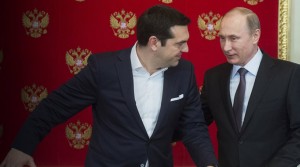The revelations that Greek PM Alexis Tsipras had asked Russian President Vladimir Putin whether Greece could print drachmas in Russia during the height of the economic crisis in 2015 have caused a stir. The information was included in a newly published book released in books stores across France on Thursday about French President Francois Hollande’s confessions, entitled “A President should not says those things” and authored by two reporters from newspaper “Le Monde”. Sources close to the Greek PM’s offices reacted to the revelations by claiming that even though there was communication between Tsipras, Hollande and Putin, the Greek PM had in way raised such a matter with the Russian President. The controversial excerpt is included in an extensive chapter focusing on some length on the Greek crisis -an the infamous Grexit- in 2015 when Tsipras had assumed political power, and describes a conversation between Hollande and Putin, with the latter telling the French President that Tsipras was considering printing drachmas in Russia. According to the book, when Hollande was informed of the Greek PM’s requests by Putin he immediately ruled such a prospect out. The passage in the book describes Tsipras as a “boisterous brother” in the words of Hollande, while it asserts Hollande had undertaken the task of advising Tsipras on the matter. The dialogues between Putin and Hollande over the phone about Greece and the possibility of the country leaving the Euro are enlightening and quite informative about the pressures of the period. According to the book, Putin relayed the information to Hollande on the phone reassuring him that Russia did not want concur to such an initiative, while Hollande was presented as wondering why the Russian President had shared this piece of information with him. In another excerpt of the chapter on Grexit, the book presents a dialogue between Hollande and French Finance Minister Sapin, in which the two men talk about IMF Head Christine Lagarde’s opinion that a Grexit would be the best course of action, while the Germans were insisting that the Greek debt was sustainable. Opposition party New Democracy (ND) realised a statement claiming that it had once more become abundantly evident that Tsipras was seriously considering leaving the Eurozone.
Ask me anything
Explore related questions





